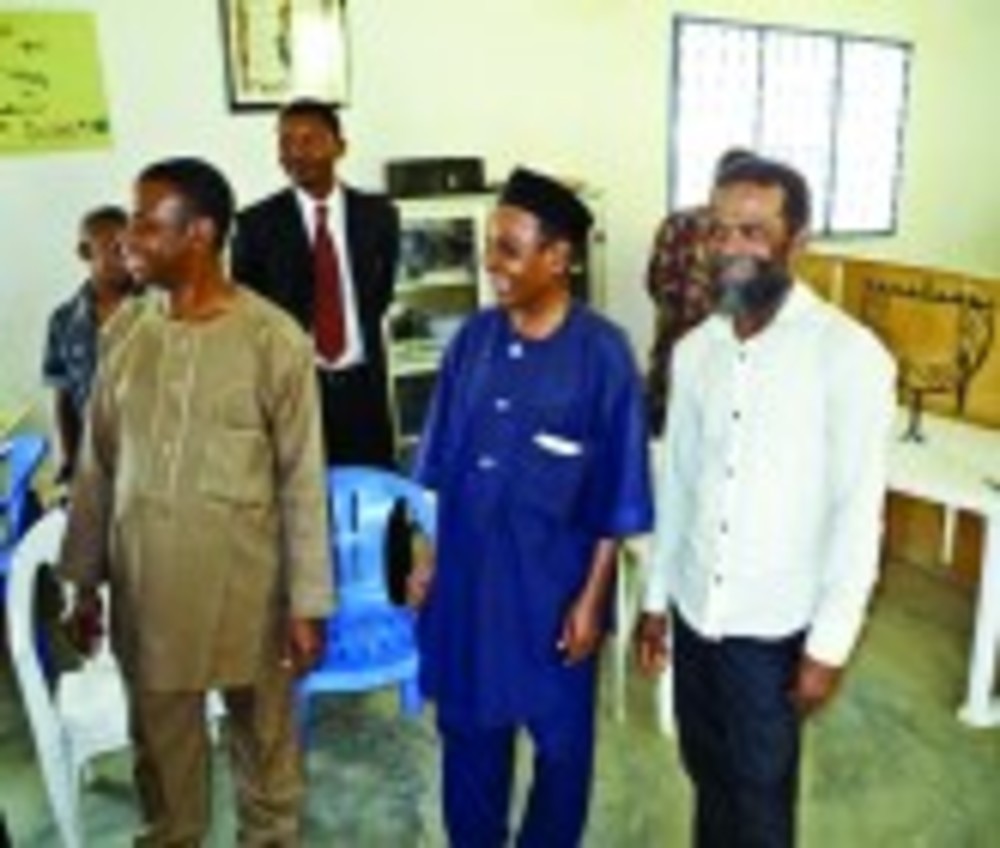Congregation Beth Sholom and Temple Emanu-El to host West African guests
 PROVIDENCE – Elder Peter Agbai, leader of Abuja’s Gihon Synagogue, and Pinchas Ogbukaa, Gihon’s spokesman, will come to Rhode Island in September to celebrate Sukkot, Shemini Atzeret and Simhat Torah. They have been invited by Congregation Beth Sholom, a synagogue, and Temple Emanu-El, a Conservative synagogue, both located on the East Side of Providence.
PROVIDENCE – Elder Peter Agbai, leader of Abuja’s Gihon Synagogue, and Pinchas Ogbukaa, Gihon’s spokesman, will come to Rhode Island in September to celebrate Sukkot, Shemini Atzeret and Simhat Torah. They have been invited by Congregation Beth Sholom, a synagogue, and Temple Emanu-El, a Conservative synagogue, both located on the East Side of Providence.
Gihon Synagogue’s members are Nigerians who have embraced Judaism but have not gone through a formal process of conversion. They believe themselves to be descendants of a lost tribe of ancient Israelites. Gihon, which has had an active congregation in Abuja since the early 1990s, built its current synagogue in 2005. After retiring as assistant director of geology for Nigeria’s Federal Capital Development Authority in 2006, Elder Agbai assumed the leadership of the synagogue.
I was welcomed at Gihon Synagogue when I journeyed to Abuja this past February. In going there, I had followed in the footsteps of Northeastern University Professor William (Bill) Miles, a member of Temple Emanu-El and the author of “Jews of Nigeria: An Afro-Judaic Odyssey” (Markus Wiener Publishers, 2013), who spent time at Gihon in 2009 and 2011. Professor Miles’ book includes 10 pages of interviews with Elder Agbai and Ogbukaa.
Rabbi Barry Dolinger, of Congregation Beth Sholom, and Rabbis Wayne Franklin and Elan Babchuck, of Temple Emanu-El, have been eager to reciprocate the hospitality shown to Professor Miles and me. The rabbis also hope that Elder Agbai and Ogbukaa’s visit will strengthen the ties between the Abuja and Providence congregations, and afford the two men the opportunity to learn more about Rhode Island’s Jewish community.
At the same time, the rabbis believe that Rhode Island Jewry can learn from those now practicing Judaism in Abuja.
“These people are serious,” said Rabbi Franklin. “We should be as dedicated and enthusiastic to learn as they are.”
One of the main difficulties confronting the members of Gihon and Tikvat Israel, another Nigerian synagogue in Abuja, headed by Elder Habakkuk Nwafor, is their distance from world Jewry.
“We are adherents of the Jewish faith in Nigeria. We are neither Christian nor Muslim,” said Ogbukaa, explaining the purpose of traveling to Rhode Island. “The greatest of all the challenges we are facing is that of isolation.”
Ogbukaa is optimistic that the holiday visit will help break this isolation and raise more awareness that there are people practicing Judaism in Nigeria.
“Bridges of Jewish education and worship have to be built, connecting us with other communities in the United States and Israel,” Ogbukaa said.
Although Gihon’s members try to follow the practices of Orthodox Judaism, as it is understood in Nigeria, Elder Agbai and Ogbukaa are pleased to soon have the chance to meet Temple Emanu-El’s rabbis and congregants as well.
“We believe that the acceptance of the Torah binds all Jews together as one, irrespective of being Orthodox, Conservative, etc.,” said Ogbukaa. “The type of congregation is a matter of choice. Each has something positive to contribute to the growth of world Jewry.”
The two men will also attend services at Sha’arei Tefilla, an Orthodox synagogue on Providence’s East Side; study with Rabbi Raphie Schochet, head of the Providence Community Kollel (Center for Jewish Studies); meet with students of the Jewish Community Day School of Rhode Island and Temple Emanu-El’s Religious School; attend a meeting of the Rhode Island Jewish Historical Association and see Rabbi Marc Mandel at Newport’s Touro Synagogue.
The Newport synagogue is of special interest to Elder Agbai and Ogbukaa. Not only is it the oldest in the United States, but it was built according to Sephardic custom, and Gihon’s members try to follow the Sephardic and Edot Hamizrach traditions of Jews from North Africa and the Middle East.
Rabbi Dolinger is proud of the interdenominational cooperation involved in inviting the two men to Providence. “It sometimes seems that Providence Jews suffer from an inferiority complex in relation to larger and wealthier cities, but we have tremendous resources of our own here,” he said. “Other Jewish communities can follow our model and forge relationships with synagogues in Nigeria.”
“We are living in an extraordinary, globalizing, Jewish world,” added Professor Miles. “A vibrant Jewish community in West Africa, whom hardly anyone had heard of five years ago, is already sending a delegation to Providence to learn how American Jews practice Judaism in our Diaspora. Amazing!”
Shai Afsai (ggbi@juno.com), a member of Congregation Beth Sholom, lives in Providence and may be con-tacted for more information on this visit.







